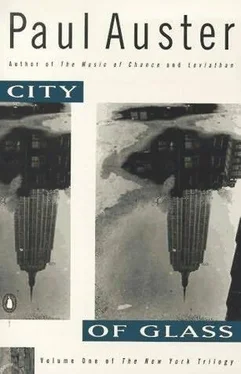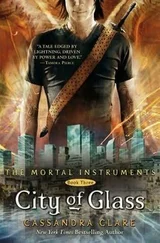Paul Auster - City of Glass
Здесь есть возможность читать онлайн «Paul Auster - City of Glass» весь текст электронной книги совершенно бесплатно (целиком полную версию без сокращений). В некоторых случаях можно слушать аудио, скачать через торрент в формате fb2 и присутствует краткое содержание. Жанр: Современная проза, на английском языке. Описание произведения, (предисловие) а так же отзывы посетителей доступны на портале библиотеки ЛибКат.
- Название:City of Glass
- Автор:
- Жанр:
- Год:неизвестен
- ISBN:нет данных
- Рейтинг книги:5 / 5. Голосов: 1
-
Избранное:Добавить в избранное
- Отзывы:
-
Ваша оценка:
- 100
- 1
- 2
- 3
- 4
- 5
City of Glass: краткое содержание, описание и аннотация
Предлагаем к чтению аннотацию, описание, краткое содержание или предисловие (зависит от того, что написал сам автор книги «City of Glass»). Если вы не нашли необходимую информацию о книге — напишите в комментариях, мы постараемся отыскать её.
City of Glass — читать онлайн бесплатно полную книгу (весь текст) целиком
Ниже представлен текст книги, разбитый по страницам. Система сохранения места последней прочитанной страницы, позволяет с удобством читать онлайн бесплатно книгу «City of Glass», без необходимости каждый раз заново искать на чём Вы остановились. Поставьте закладку, и сможете в любой момент перейти на страницу, на которой закончили чтение.
Интервал:
Закладка:
Quinn smiled weakly. "No problem," he said. "I was just wondering if you liked the book."
The girl shrugged. "I've read better and I've read worse."
Quinn wanted to drop the conversation right there, but something in him persisted. Before he could get up and leave, the words were already out of his mouth. "Do you find it exciting?"
The girl shrugged again and cracked her gum loudly. "Sort of. There's a part where the detective gets lost that's kind of scary.
"Is he a smart detective?"
"Yeah, he's smart. But he talks too much."
"You'd like more action?"
"I guess so."
"If you don't like it, why do you go on reading?"
"I don't know." The girl shrugged once again. "It passes the time, I guess. Anyway, it's no big deal. It's just a book."
He was about to tell her who he was, but then he realized that it made no difference. The girl was beyond hope. For five years he had kept William Wilson's identity a secret, and he wasn't about to give it away now, least of all to an imbecile stranger. Still, it was painful, and he struggled desperately to swallow. his pride. Rather than punch the girl in, the face, he abruptly stood up from his seat and walked away.
At six-thirty he posted himself in front of gate twenty-four. The train was due to arrive on time, and from his vantage in the center of the doorways Quinn judged that his chances of seeing Stillman were good. He took out the photograph from his pocket and studied it again, paying special attention to the eyes. He remembered having read somewhere that the eyes were the one feature of the face that never changed. From childhood to old age they remained the same, and a man with the head to see it could theoretically look into the eyes of a boy in a photograph and recognize the same person as an old man. Quinn had his doubts, but this was all he had to go on, his only bridge to the present. Once again, however, Stillman's face told him nothing.
The train pulled into the station, and Quinn felt the noise of it shoot through his body: a random, hectic din that seemed to join with his pulse, pumping his blood in raucous spurts. His head then filled with Peter Stillman's voice, as a barrage of nonsense words clattered against the walls of his skull. He told himself to stay calm. But that did little good. In spite of what he had been expecting of himself at this moment, he was excited.
The train was crowded, and as the passengers started filling the ram I p and walking toward him, they quickly became a mob. Quinn flapped the red notebook nervously against his right thigh, stood on his tiptoes, and peered into the throng. Soon the people were surging around him. There were men and women, children and old people, teenagers and babies, rich people and poor people, black men and white women, white men and black women, Orientals and Arabs, men in brown and gray and blue and green, women in red and white and yellow and pink, children in sneakers, children in shoes, children in cowboy boots, fat people and thin people, tall people and short people, each one different from all the others, each one irreducibly himself. Quinn watched them all, anchored to his spot, as if his whole being had been exiled to his eyes. Each time an elderly man approached, he braced himself for it to be Stillman. They came and went too quickly for him to indulge in disappointment, but in each old face he seemed to find an augur of what the real Stillman would be like, and he rapidly shifted his expectations with each new face, as if the accumulation of old men was heralding the imminent arrival of Stillman himself For one brief instant Quinn thought, "So this is what detective work is like." But other than that he thought nothing. He watched. Immobile among the moving crowd, he stood there and watched.
With about half the passengers now gone, Quinn had his first sight of Stillman. The resemblance to the photograph seemed unmistakable. No, he had not gone bald, as Quinn had thought he would. His hair was white, and it lay on his head uncombed, sticking up here and there in tufts. He was tall, thin, without question past sixty, somewhat stooped. Inappropriately for the season, he wore a long brown overcoat that had gone to seed, and he shuffled slightly as he walked. The expression on his face seemed placid, midway between a daze and thoughtfulness. He did not look at the things around him, nor did they seem to interest him. He had one piece of luggage, a once beautiful but now battered leather suitcase with a strap around it. Once or twice as he walked up the ramp he put the suitcase down and rested for a moment. He seemed to be moving with effort, a bit thrown by the crowd, uncertain whether to keep up with- it or to let the others pass him by.
Quinn backed off several feet, positioning himself for a quick move to the left or right, depending on what happened. At the same time, he wanted to be far enough away so that Stillman would not feel he was being followed.
As Stillman reached the threshold of the station, he put his bag down once again and paused. At that moment Quinn allowed himself a glance to Stillman's right, surveying the rest of the crowd to be doubly sure he had made no mistakes. What happened then defied explanation. Directly behind Stillman, heaving into view just inches behind his right shoulder, another man stopped, took a lighter out of his pocket, and lit a cigarette. His face was the exact twin of Stillman's. For a second Quinn thought it was an illusion, a kind of aura thrown off by the electromagnetic currents in Stiliman's body. But no, this other Stillman moved, breathed, blinked his eyes; his actions were clearly independent of the first Stillman. The second Stillman had a prosperous air about him. He was dressed in an expensive blue suit; his shoes were shined; his white hair was combed; and in his eyes there was the shrewd look of a man of the world. He, too, was carrying a single bag: an elegant black suitcase, about the same size as the other Stillman's.
Quinn froze. There was nothing he could do now that would not be a mistake. Whatever choice he made-and he had to make a choice-would be arbitrary, a submission to chance. Uncertainty would haunt him to the end. At that moment, the two Stillmans started on their way again. The first turned right, the second turned left. Quinn craved an amoeba's body, wanting to cut himself in half and run off in two directions at once. "Do something," he said to himself, "do something now, you idiot." For no reason, he went to his left, in pursuit of the second Stillman. After nine or ten paces, he stopped. Something told him he would live to regret what he was doing. He was acting out of spite, spurred on to punish the second Stillman for confusing him. He turned around and saw the first Stillman shuffling off in the other direction. Surely this was his man. This shabby creature, so broken down. and disconnected from his surrounding-surely this was the mad Stillman. Quinn breathed deeply, exhaled with a trembling chest, and breathed in again. There was no way to know: not this, not anything. He went after the first Stillman, slowing his pace to match the old man's, and followed him to the subway.
It was nearly seven o'clock now, and the crowds had begun to thin out. Although Stillman seemed to be in a fog, he nevertherless knew where he was going. The professor went straight for the subway staircase, paid his money at the token booth below, and waited calmly on the platform for the Times Square Shuttle. Quinn began to lose his fear of being noticed. He had never seen anyone so lost in his own thoughts. Even if he stood directly in front of him, he doubted that Stillman would be able to see him.
They travelled to the West Side on the shuttle, walked through the dank corridors of the 42nd Street station, and went down another set of stairs to the IRT trains. Seven or eight minutes later they boarded the Broadway express, careened up town for two long stops, and got off at 96th Street. Slowly making their way up the final staircase, with several pauses as Stillman set down his bag and caught his breath, they surfaced on the corner and entered the indigo evening. Stillman did not hesitate. Without stopping to get his bearings, he began walking up Broadway along the east side of the street. For several minutes Quinn toyed with the irrational conviction that Stillman was walking toward his house on 107th Street. But before he could indulge himself in a full-blown panic, Stillman stopped at the comer of 99th Street, waited for the light to change from red to green, and crossed over to the other side of Broadway. Halfway up the block there was a small fleabag for down-and-outs, the Hotel Harmony. Quinn had passed it many times before, and he was familiar with the winos and vagabonds who hung around the place. It surprised him to see Stillman open the front door and enter the lobby. Somehow he had assumed the old man would have found more comfortable lodgings. But as Quinn stood outside the glass-paneled door and saw the professor walk up to the desk, write what was undoubtedly his name in the guest book, pick up his bag and disappear into the elevator, he realized that this was where Stillman meant to stay.
Читать дальшеИнтервал:
Закладка:
Похожие книги на «City of Glass»
Представляем Вашему вниманию похожие книги на «City of Glass» списком для выбора. Мы отобрали схожую по названию и смыслу литературу в надежде предоставить читателям больше вариантов отыскать новые, интересные, ещё непрочитанные произведения.
Обсуждение, отзывы о книге «City of Glass» и просто собственные мнения читателей. Оставьте ваши комментарии, напишите, что Вы думаете о произведении, его смысле или главных героях. Укажите что конкретно понравилось, а что нет, и почему Вы так считаете.












